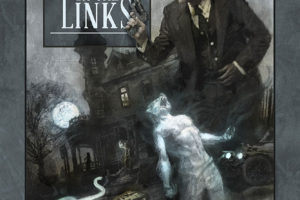This year we got a new Solar Pons collection from Belanger Books that finally provides us with longer works, novellas in this case: The Novellas of Solar Pons. For those not aware, a “novella” is a “short novel”.
 While there are more Solar Pons stories from August Derleth than Sherlock Holmes works from Arthur Conan Doyle, Derleth published only one Pons novella and Doyle did four novels/novellas. And only one further Pons novella was written by Basil Copper.
While there are more Solar Pons stories from August Derleth than Sherlock Holmes works from Arthur Conan Doyle, Derleth published only one Pons novella and Doyle did four novels/novellas. And only one further Pons novella was written by Basil Copper.
I’ve posted on Solar Pons before, recently doing a re-reading of both the original stories by Derleth, the followup works by Copper’s, and covering the newer ones that have appeared under the direction of David Marcum.
Pons is a Holmes “pastiche” created by Derleth when he learned no new Sherlock Holmes stories were forthcoming. Instead of making him a copy, he is a separate character who sees Holmes as his mentor and predecessor. Holmes had retired to Sussex Downs around the turn of the century (1903 to be exact), though he did come out of retirement to aid Britain during WWI (and a few other times).
Pons’ career was mainly in the 1920s and ’30s, though he started in 1907, with a pause during WWI for military intelligence work, and in 1918 (or was it 1917?) started living on Praed Street with Dr. Lyndon Parker. They returned to military service in WWII, with Pons again working for military intelligence. He most likely retired after that. But as he occasionally visited or consulted with Holmes during his career, there were opportunities for them to work together either in the teens, 1920s, or ’30s.
David Marcum has been overseeing the new Pons revival, teaming up with Derrick Belanger who has been publishing all of this. This time we get four new novellas, plus a radio adaptaion of a Derleth story. This one kicks off with a short intro by Belanger on what a “novella” is. It’s basically a long short story or a short novel. As a short novel, the title gets italicized, and often published as a single volume. There are many well-known novels that are properly novellas. The usual definition is a novella is from 17,500 to 40,000 words, and a novel is over 40,000.
First up is The Adventure of Mack the Chipper by Chris Chan. Someone has been killing several men, four so far, two being members of Parliament. The only clue is an order of fish and chips left at the scene, all apparently bought at whatever local chips shop was closest. The commissioner of Scotland Yard comes to Pons to help solve it, and keep it quite to avoid scandal. Will Pons be able to do so with such scant evidence?
David Marcum provides us with The Adventure of the Immortal Dead Man. Pons is approached by a mathematician, Neil Ashford, who is working in the area of quantum mechanics. Ashford thinks he has discovered a way to live forever, but he feels someone is menacing him, and he points to a colleague and former friend. He is soon gunned down upon leaving 7B Praed Street. Was he murdered by his friend, or was it a foreign agent, or some other diabolical foe? Pons and Parker will have to figure it all.
A somewhat different story is The Devil’s Book by Nick Cardillo. A mysterious and wealthy client, Claude Dixon, claims that a 300-year-old spell book with the power to summon the Devil himself has been stolen. Pons starts to look into it, starting with the person Dixon implies has stolen it, but finds the man dead by suicide. Soon they are finding other deaths tied to this book, including their client’s. And there seems to be a sinister figure shadowing them. Is there something supernatural here, or a more mundane explanation? And can it be solved before more die?
Finally, we get The Goblins of Faegan Hill by Derrick Belanger. An archaeologist who seems to have a belief in Atlantis and Mu is found dead at his latest dig in Wales. But here the case is blamed on goblins, which locals say they have seen. And there are mysterious tracks near his body, maybe of a satyr. But a satyr isn’t a goblin. Do we have another case of supernatural causes, or more down-to-earth ones, and if so why?
Because the Kickstarter campaign was so successful, we got a bonus work in the volume. A radio play adapted by Catherine Behrens from a Derleth story, “The Adventure of the Late Mr. Faversham.” In this one, Mr. Faversham entered his house and was never seen again. The original story was inspired by an unwritten Sherlock Holmes adventure.
I enjoyed all these tales, but I would have liked to have seen one done in the style of most of Doyle’s Holmes novellas. Most of them have the crime based on past events, such that a good portion of the work is taken up with revealing those events. This is something I’ve not seen used in most Holmes pastiches, and I would have like to have seen it done here.
What does the future hold for Solar Pons and us? Well, we should see another edition of the Pontine Dossier sometime this year, and we are promised a new collection of Solar Pons stories from David Marcum coming to Kickstarter this winter, to be titled Further Papers of Solar Pons. I can’t wait.



